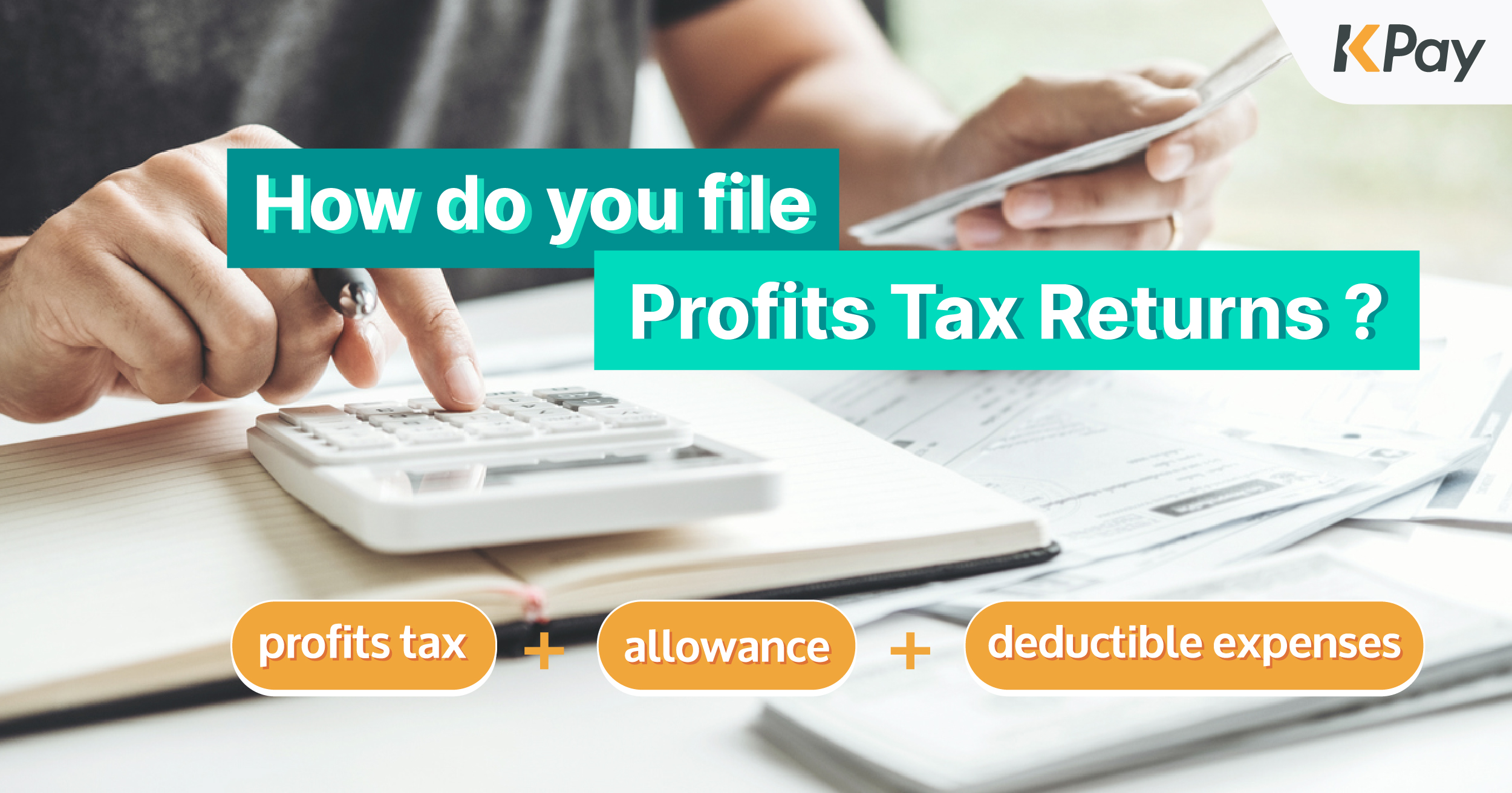
The process of company tax filing, including the deadlines, required documents, and even the complexities of filling out tax forms, can be quite daunting! How should you fill out the company tax return? Whether you are preparing to file income tax (profits tax) for your company for the first time or you are experienced in filing tax but want to seek suitable accounting firm services, we will explain everything below.
**Don't want to suffer through tax filing anymore? KPay now offers exclusive seasonal offers to help you choose the most suitable accounting management system and tax filing team at a discounted price. Our team will handle and prepare all the necessary tax documents and reports for you. Remember to read through the end and claim the offer!
Regardless if the company is a limited or unlimited company, as long as your business has earned profit in the last fiscal year, you are required by the law to file profits tax. For different companies, there are different methods for tax filing.
Unlimited company that is owned by a sole proprietor (i.e. owned by one single person) can submit their tax filing on his/her individual’s tax form. Limited companies will have to perform financial audits before filing their taxes and filling in the Profits Tax Return form.
Not every company has to file for tax each year. Some companies can file for tax when they receive requests to check for potential tax liabilities from the IRD, or when they receive profits tax form from IRD. Some examples include:
- Companies that have not commenced operations
- Companies that have ceased or not yet restarted operations
- Companies that are not profiting or with a recorded deficit.
Tax filing deadlines for limited companies:
The Inland Revenue Department (IRD) will send the Profit Tax Return forms to all non-first-time tax filing limited companies on the first working day of April every year. Limited companies have one month to complete the tax return form and prepare relevant documents, including declaring the total taxable amount, audit reports, and other supporting proofs before the deadline. If companies choose to file tax online an extension may be granted which will be discussed later in this text.
Tax filing deadlines for unlimited companies:
Similar to how it works for limited companies, IRD will send Profit Tax Return forms to unlimited companies on the first working day of April every year.
Unlimited companies can choose the method of tax filing based on their business nature. If your unlimited company operates as a partnership, you need to submit the tax return form and necessary documents within one month of receiving the tax forms. Your submission includes financial statements, profit and loss statements, and balance sheets. It is also necessary to clearly state the profits earned by each partner in the tax return form.
If the unlimited company operates as a sole proprietorship, the company's responsible person can declare tax on ‘Part 5: Profits Tax’ of their Individuals’ Tax Return form, and is therefore not required to declare taxations as an unlimited company.
Tax filing deadlines for new companies:
Newly established limited companies and partnerships typically receive Tax Return forms from the tax authorities within approximately 18 months from the date of establishment. Upon receiving the Tax Return forms, companies are required to file their taxes within three months and cannot apply for an extension.
Sole proprietorship unlimited companies may elect to declare tax on their individual’s tax return form.
If a company wishes to delay its tax filing, it must apply for a tax filing extension in advance with the IRD. The possible extended deadline will be determined based on the company's fiscal year-end date. Taking the 2022/2023 year as an example, the estimated schedule for delayed tax filing is as follows:
| Fiscal year end date | Extended due date | Electronic filing extended due date | |
|---|---|---|---|
| N Code | 1 Apr to 30 Nov | Within 1 month from the date of issue | Cannot postpone |
| D Code | 1 Dec to 31 Dec | Within 1 month from the date of issue | 29 Aug 2024 |
| M Code | 1 Jan to 31 Mar | Within 1 month from the date of issue | 29 Nov 2024 |
| M Code with recorded deficit | / | Within 1 month from the date of issue | 31 Jan 2025 |
Along with tax filing forms, The IRD will also include instructions on how to apply for extensions on their forms should a tax filing extension is needed. Generally, companies filing taxes online are typically granted an additional month compared to those that are using the traditional paper-based method.
- Receive the Tax Return forms from The Inland Revenue Department (IRD)
- Conduct a financial audit. Prepare the financial statements, profit and loss statements, balance sheets, and other relevant documents and reports
- Completes the Tax Return forms.
- Submit the Tax Return Forms, along with all of the necessary supplementary forms and documents, either online, in-person, or by mail.
- The IRD sends the Demand Note after receiving and affirming the filing of your tax returns.
- The company pays the amount as stated.
1. Company Tax Return Forms
The company should choose the appropriate Tax Return form based on its business background, including:
- Profits Tax Return - Corporations (BIR51)
- Profits Tax Return - Persons Other Than Corporations (BIR52)
- Profits Tax Return - In Respect Of Non-Resident Persons (BIR54)
- Tax Return – Individuals (BIR60)
2. Audited financial statements
With the following exceptions, all companies are required to submit audited financial statements along with their Tax Return forms. The exempted companies include:
- Companies deemed non-active under the Companies Ordinance (Cap. 622)
- Companies registered in a jurisdiction where financial audit is not required by law
- Hong Kong branches of foreign companies (proof of exemption is required)
3. Balance sheet
4. Profit and loss statement
5. Profit tax computation and related forms that explain how the taxable profits are calculated
6. Other supplementary documents and information
Note: Starting from April 1, 2023, small corporations and businesses are required to submit the aforementioned supporting documents along with their tax return forms, regardless of the amount of income earned.
Hong Kong implements a two-tiered tax profit tax rate system for limited companies and unlimited companies:
| Limited companies | Unlimited companies | |
|---|---|---|
| First HK$2 million of taxable profits | 8.25% | 7.5% |
| Taxable profits exceeding HK$2 million | 16.5% | 15% |
The majority of companies are subject to the above profits tax rates. However, if a company has any associated companies - meaning the company is being controlled by another company or is owned by the same person, the above two tier system does not apply and the company should file their tax at either 16.5% (for limited companies) or 15% (for unlimited companies).
Certain companies by default do not qualify for the two-tier tax system, including but are not limited to insurance companies, corporate treasury centres and aircraft leasing companies. For details, please refer to the government's tax regime.
According to the 2024-25 Budget from the Hong Kong government, the maximum reduction in corporate income tax for the 2023/24 fiscal year is set at $HK3,000. Additionally, all expenses incurred for the purpose of generating business income can be used as deductions for corporate taxes, which includes:
- Employee salaries, allowances, benefits, severance payments, long-term service awards, and dormitory rents
- The company’s contributions to employees’ Mandatory Provident Fund Schemes (MPF)
- Transportation expenses and expenditures related to business entertainment
- Insurance fees
- Expenditure on building refurbishment
- Rent, utility bills, telephone expenses, management fees, air conditioning, and property management fees
- Costs incurred for the production of goods, daily operations, and provision of services, such as accounting fees for tax filing
- Expenditure on environmental protection facilities, including machinery, devices, or eco-friendly vehicles
- Expenses for the establishments, acquisition or maintenance of machinery, industrial facilities, computer hardware, or software
- Donations made to approved charitable organisations, charitable trusts, or government entities of a public nature
- Interest payments on loans and legal expenses
- Bad debts
Most SME owners might not have experience in auditing. Filing tax returns for the company can also be complicated and time-consuming. The whole process of sorting receipts and bills could lead to mistakes in financial reports; the worst scenario could be unintentional tax evasions and violating the law! If you don’t want to be troubled by tax filing anymore, there are actually a lot of professional accounting systems or accounting firms that do the job for you. Here are some examples for your reference.
| Pricing | Function and services | |
|---|---|---|
| Sleek | from HK$4,800 KPay merchants now enjoy an exclusive special deal. |
|
| From HK$8,300 KPay merchants now enjoy an exclusive special deal. |
| |
| CLG Group | Please request for a quotation KPay merchants now enjoy an exclusive special deal. |
Assisting in applying for overseas income tax exemption |
| Osome | From HK$5,500 KPay merchants now enjoy an exclusive special deal. |
|
| Smart Way Services Limited | From HK$7,000 |
|
| Brilliant Business Center | From HK$4,800 |
|
| Asia Professional Accounting & Consultant Ltd | From HK$13,800 |
|
KPay understands the worries of SMEs towards tax filing. Tired of the hassle of bills, reports, and documents? KConnect, the all-in-one merchant business management platform, offers a collection of accounting management systems with exclusive offers. This allows you to find the best solution that meets your auditing and tax filing needs, providing you with professional management systems and accountants who will handle your bills, bookkeeping, and tax filing promptly, accurately, and in compliance with the law. Say goodbye to the pain of tax filing and save money! Click 'Started now' below to connect with KPay's digital transformation experts and learn more!
⭐⭐ 3 key benefits of KPay - Comprehensive business management system and operational support ⭐⭐
Easy process:
KPay understands your business needs and background, eliminating your need to resubmit business documents. Your KConnect digital transformation consultant will handle the process for you.
Personalised assistance:
KPay provides dedicated guidance to merchants on using the accounting management system and continuously follows up on user experience. Compared to traditional accounting firms, we offer more personalized and comprehensive consulting and support services.
All-in-one management:
KConnect offers 90+ business systems and services. With the help of KConnect digital transformation consultants, they will analyze and advise on all of your business systems based on your business background and data, providing personalized digital solutions. With one contact, we solve all of your customer service inquiries regarding business systems, increasing the communication efficiency.

